The Economics of Irish Partition
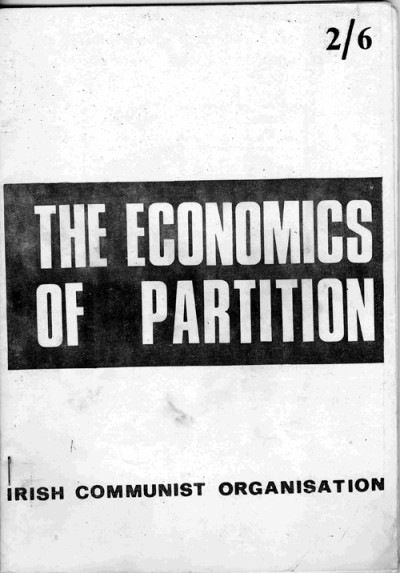
| Date: | 1969 |
|---|---|
| Organisation: | Irish Communist Organisation |
| Edition: | 2nd |
| View: | View Document |
| Discuss: | Comments on this document |
| Subjects: |
Please note: The Irish Left Archive is provided as a non-commercial historical resource, open to all, and has reproduced this document as an accessible digital reference. Copyright remains with its original authors. If used on other sites, we would appreciate a link back and reference to The Irish Left Archive, in addition to the original creators. For re-publication, commercial, or other uses, please contact the original owners. If documents provided to The Irish Left Archive have been created for or added to other online archives, please inform us so sources can be credited.
Commentary From The Cedar Lounge Revolution
13th June 2011
Perhaps best known as the precursor of the British and Irish Communist Organisation who assumed that name around November 1971, The Irish Communist Organisation already has two documents in the archive. There’s also a critique in the Archive from the Cork Communist Organisation on the development of the ICO.
This is a seminal document in terms of the Irish left. First printed in January 1969, and then reprinted in November of the same year, and produced by the Irish Communist Organisation it outlined in six chapters an analysis of the Irish Partition and the economic effects of it. However, it also went on in chapters dealing with The Northern Ruling Class and The Civil Rights Movement to engage with a range of political aspects of the period it was written in.
It starts with a quote from Stalin on Theory and the Working Class Movement…
…theory, and theory alone, can give the movement confidence, the power of orientation, and an understanding of the inner relation of surrounding events; for it, and it alone, can help practice to realise not only how and in what direction classes are moving at the present time, but also how and in which direction they will move in the near future. None other than Lenin uttered and repeated scores of times the well-known thesis that: ‘Without a revolutionary theory, there can be no revolutionary movement’.
This is a long document but a few quotes will give some some sense of the arguments made in it.
It notes that:
Since THE ECONOMICS OF PARTITION was published ten months ago the correctness of its analysis of the Partition situation, and of the current crisis in Ulster, has been put beyond all doubt by the political developments in Ulster. In its main outlines the ICO analysis can no longer be denied by anybody who thinks at all. In the course of the the summer the ‘uneven development of capitalism’ explanation began to turn up even in the staunchest anti-Communist circles - notably in the Trotskyist groups - though of course no mention was made of its Stalinist origins.
It also notes that the structure of the pamphlet is in part drawn from it being a collection of three articles published in ‘The Irish Communist’ and a ‘further three added at the last moment’.
In a piece that asks “What is the Six Counties” [from 1967] it states that: Nationally, it is a part of the Irish nation. Politically, it is part of the British State. Economically - for the past century and more - the dominant industry has been a section of British capitalism (from the end of the 19th century, monopoly capitalism) which jutted into the 6 Counties.
Interestingly, in view of the Preface, in The Economics of Irish Partition Part 1 it ascribes the ‘uneven development’ concept to Peadar O’Donnell.
Peadar O’Donnell’s explanation stands out a mile from this kind of balderdash, and brings us into the world of reality (though O’Donnell, unlike our Desmond [Greaves], has never claimed to be a Marxist). “Partition arises out of the uneven development of capitalism in Ireland: sentiment won’t remove it.”
The “uneven development of capitalism in Ireland” refers to the fact that a modern industrial capitalism developed in the North in the course of the 19th century, while in the South capitalist industry declined. The real history of Ireland has been greatly obscured by religious and racial propaganda and the respective myths developed by the southern middle class and the northern industrialists.
That particular essay concludes with the idea that:
There are two bases on which a strong political movement for “unification” could arise. It could come from a strong political development of the working class in Ireland. Such a development has not occurred for various reasons. The other base would base would be a change in the relations between the dominant forms of capitalism in the North and the South. Either there could be a run-down of capital in the North or a build-up of capital in the South, (or both), bringing the two closer together. What is certain is that a unification movement based on sentiment and not grounded in some class interest would have little influence on the course of events.
In terms of future developments in ICO and BICO there are fewer hints than might be expected. However, in the Appendix on Paisleyism there is the following comment:
In this situation what is needed to serve the anti-imperialist interest is not an inflating of Paisley into a Hitler (which imperialism is doing in its own interest), but a clear exposure of what imperialism is doing. It is trying to take on an appearance which it hopes will be less easily identifiable as imperialism than Carsonism was. We must learn to identify it under its new appearance. Paisleyism is not the main enemy. The main enemy is the forces represented by O’Neill and Wilson. The forces that are now trying to represent themselves as the forces of democracy struggling against Paisley’s “Hitlerism”.
There’s an analysis of this document available here and next week we will examine a critique from the Cork Workers’ Club (see Irish Socialists, Partition and the Struggle in the North).
Apologies for the faint text on some pages. This is due to the quality of the original. It’s also worth noting that pages 25-28, the centre spread, are stapled in upside down on the copy this was scanned from. I’ve amended that for ease of reading.
More from Irish Communist Organisation
Irish Communist Organisation in the archive
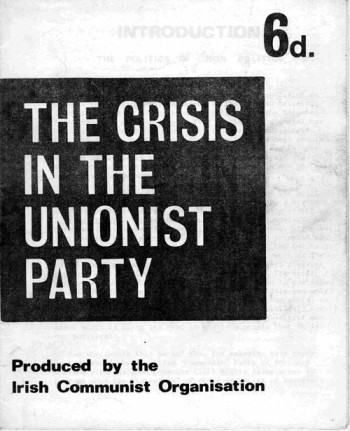
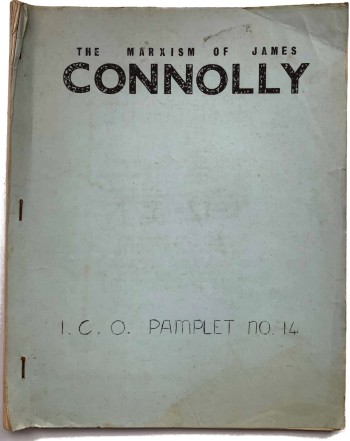
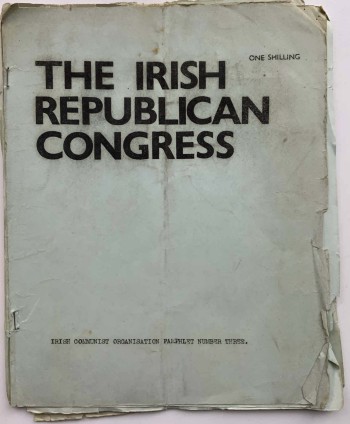
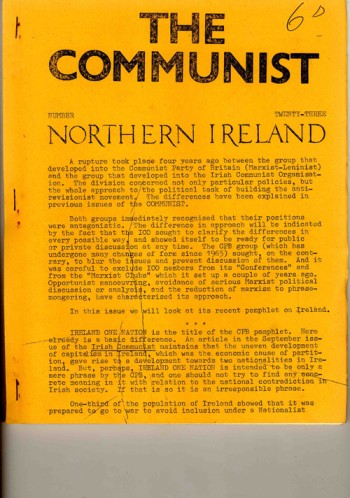
Comments
No Comments yet.
Add a Comment
Comments can be formatted in Markdown format . Use the toolbar to apply the correct syntax to your comment. The basic formats are:
**Bold text**
Bold text
_Italic text_
Italic text
[A link](http://www.example.com)
A link
You can join this discussion on The Cedar Lounge Revolution
By: NollaigO Mon, 13 Jun 2011 08:04:31
Am I missing a key part ?
From a quick scan of the document, I cannot find a statement of the two nations theory and its political implications. It was this that gave the ICO/ BICO its high profile from the 1970s onwards. One could argue that this pamphlet advanced the economic rationale for the two nations theory
IIRC the subsequent argument was : The uneven development of capitalism in Ireland that arose out of the Ulster Custom which allowed a primitative accumulation of capitalism. This in turn led to the rise of a new nation, the northern protestants, who were correctly exercising their right to national self determination, by supporting the political union with the London government.
The theory is challengable on many levels:
1) Why just a protestant nation? Why not a northern Irish nation ?
2) Various alternative explanations of the industrial development of north east Ireland stress the role of external influences. From a glance this is what on of the links referenced above attempts to do. Also a pamphlet written in 1969/70 by D.R. O’Connor Lysaght argued that British capital in the 19th century was decisive in this industrial development. [Title: The making of the Six Counties?? (Jim! Help!)]
3) Unionism/ Loyalism was (still is) a 32 county phenomenon. It has specific characteristics in the North which are explaned more by the 17th centuy plantations and Williamite Wars than by the rise of the Linen industry.
The strength of the BICO position was their advocacy that any political progress required the establishment of political institutions which recognised the historic deep seated divisions.
Reply on the CLR
By: Mark P Mon, 13 Jun 2011 12:39:42
You are correct that this pamphlet does not expound the two nations theory.
The ICO was still a left-nationalist formation in 1969. When it executed its political about-face, many of the core arguments of this pamphlet were put to new use as part of the justification for the two nations theory. The British Maoist critique linked to above tends to conflate the pamphlet with later BICO politics.
Reply on the CLR
By: Seán Ó Tuama Mon, 13 Jun 2011 12:50:02
In reply to NollaigO.
The title of the pamphlet was “The Making of Northern Ireland & The Basis of its Undoing”, Citizens Committee, 1970. Can’t find my own copy at the moment.
Reply on the CLR
By: NollaigO Tue, 14 Jun 2011 09:33:04
I was surprised with the date 1969 as my own recollections were that it was published in the early 1970s. A Google search has confirmed that a later edition was published in 1972. This would probably be regarded as the definitative edition with claimed sales of 20,000 copies.The British Maoist critique of this pamphlet in 1974 which linked to above probably is a response to this edition.
The 1972 edition would also be an appropriate addition to the archives if it could be obtained.
Not widely realised is that the political about-face of the early 1970s also resulted in BICO changing their views on Maoism. Indeed I clearly remember them siding with Tariq Ali when he was involved in a polemic with the orthodox Maoists in Britain over Bangladesh – the Chinese government supported the Pakistan government and opposed the setting up of the Bangladesh state. This was one of many differences with Maoism that they outlined at the time.
The Bob Purdie pamphlet “Ireland Unfree” available in the CLR archives has a detailed comment on BICO. Purdie noted that there was much in common with Kautsky in their thinking. This proved to be very perceptive as BICO subsequently published English translations of many of Kautsky’s works including his writings on Ireland (linked to below).
http://www.marxists.org/archive/kautsky/1922/ireland/index.htm
Reply on the CLR
By: LeftAtTheCross Tue, 14 Jun 2011 09:44:27
In reply to NollaigO.
The book is is still available via Athol books:
https://www.atholbooks-sales.org/add_cart.php?id=59
Reply on the CLR
By: Budapestkick Tue, 14 Jun 2011 13:44:13
‘In its main outlines, the ICO analysis can no longer be denied by anybody who thinks at all’ – You have to admire their confidence.
Reply on the CLR